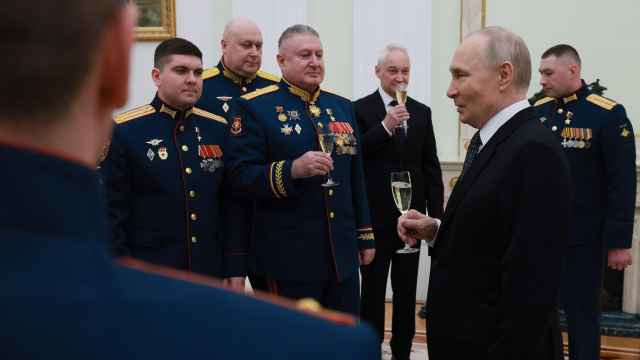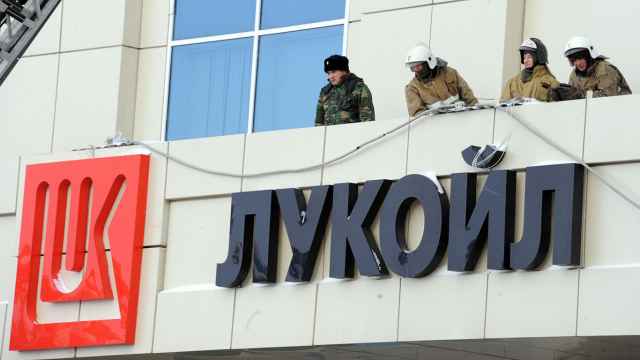Within hours of announcements in Washington and Brussels last week that sanctions on Russia over its actions in Ukraine would be stepped up, Russian President Vladimir Putin said he would consider how to retaliate.
Moscow has proven once that it can act. In August, Russia banned food imports from Western countries worth $9 billion annually.
Economic Development Minister Alexei Ulyukayev said Tuesday that retaliatory measures should not go beyond the agricultural sector, but other more hawkish voices have called for Moscow to be bolder.
The Moscow Times looked at some of the options that may have landed on Putin's desk, ranging from the plausible to the fanciful.
Russia could:
1. Close Russian airspace to Western airlines.
Russia covers just over 17 million square kilometers of land between the economic hubs of Europe and China. Shutting the airspace to Western airlines flying over Russia would hand Asian airlines a competitive advantage over their Western rivals and "bankrupt" a number of Europe's flyers, which would have to fly further, using more fuel and wasting aircraft hours, Prime Minister Dmitry Medvedev last week.
However, according to British businessman and owner of Virgin Airlines Richard Branson, the move would hit Russia hardest. Since cutting a deal with the Soviet Union in the 1970s, Western airlines have paid a fees to fly over Russian territory amounting to about $300 million per year. These would be forfeited immediately, and the Kremlin could expect the West to adopt countermeasures, Branson said.
2. Shut off gas supplies to Europe.
The EU gets a third of its gas from Russia, heating millions of European voters' homes. Russia's Kremlin-controlled gas export monopoly, Gazprom, shut off supplies to Ukraine for the third time in eight years in June. In recent days, a number of Eastern European countries have reported sharp, unexplained falls in Russian gas delivery volumes. Poland, one of the countries affected, said Russia was testing Polish resolve.
But the nuclear option — a supply cut to Europe — would create serious problems for Russia. First, gas production cannot be stopped and started at whim. Second, the move would be costly. Gazprom sold gas worth $60-70 billion to Europe last year. The EU is its key customer, and Russia's pipeline infrastructure is focused on supplying it.
Western sanctions have already cut Gazprom's access to international capital markets, and the company — one of Russia's biggest taxpayers — is more reliant than ever on sales revenue to keep its operations on the road.
3. Ban car imports from the West.
Presidential aide Andrei Belousov threatened this within hours of the EU announcing the implementation of fresh sanctions on Thursday.
Russia is Europe's biggest car market after Germany, and carmakers have been ramping up local production. But over a quarter of cars and nearly half of trucks sold in Russia in the first seven months of this year were imported, according to figures by researchers ASM Holding cited by the Vedomosti newspaper.
Of 374,800 imported cars sold during that period, most of were made in countries caught up in the sanctions clash: Japan manufactured 78,987 of them; Britain 53,880; Germany 46,370; the U.S. 41,791; and the Czech Republic 32,488.
This looks ominous, but global car manufacturers would likely be able to tweak logistics to supply Russia with cars made in countries unaffected by sanctions. Russians could also switch to locally produced Western models.
4. Ban clothing imports from the West.
Belousov's second threat was to ban imports of certain European clothes and textiles.
Like Europe itself, Russia imports most of its these from Asia — over four-fifths — but Europe still managed to export shoes and clothing worth $2.6 billion to Russia last year, or 2.2 percent of total European exports to the country, according to Russia's Economic Development Ministry.
Shakhmal Ildarov, head of the a textile industry association, called for such a ban earlier this month, saying it would stimulate local production.
5. Stop helping the U.S. army reach Afghanistan.
Since 2008, the U.S. has paid Russia about $1 billion a year to facilitate the transport of NATO equipment out of Afghanistan via the Volga city of Ulyanovsk.
Supplying troops deployed in Afghanistan — which sits in the middle of the vast Asian landmass with the Himalayas and China to the east, Pakistan and Iran to the south, and a hodgepodge of former-Soviet republics to the North — has been a logistic nightmare for the U.S.
As the Afghan-Pakistan border has destabilized in recent years, Washington has become more reliant on the Russian supply corridor.
The Kremlin green-lighted the use of Ulyanovsk as a staging post through the teeth of anti-American objections. It could easily annul the deal, raising the costs of the Afghan engagement still higher for the U.S.
6. Stop using the U.S. dollar.
The U.S. reaps huge advantages from having its currency be the world's backstop, and Russia has never been happy about it.
Russia has over $400 billion in foreign currency reserves, the bulk of which is denominated in dollars. It could drop them. In March, as Moscow was annexing Crimea from Ukraine, Russia's Central Bank sold over $100 billion of U.S. Treasury bonds, showing that Russia can take drastic steps.
Russia, the world's second biggest oil exporter, could stop selling oil in dollars. This would take time and require complex contract renegotiation, but the voices calling for this are getting louder.
Meanwhile, Russia and China — another country keen to diminish the dollar's clout — agreed last week to turn away from the dollar and settle half of their trade in rubles or yuan.
7. Unite with Iran to give the West a bloody nose.
Putin and his Iranian counterpart, Hassan Rouhani, met last week to discuss cooperation in trade, energy and security, days after Russia's energy minister had visited the country and announced a gaggle agreements, including a $500 million oil-for-goods program, $10 billion in power plant construction, and training of Iranian astronauts.
Russian support would remove much of the sting of Western sanctions on Tehran, which aims to deter it from pursuing its nuclear ambitions, by relieving its economic isolation.
Iran is also a potential rival to Russia in energy exports, and has been floated as a possible supplier of gas to Europe, where it could dilute the position of Gazprom.
8. Deliver advanced weaponry to the West's enemies.
Russia is a military technology and weapons powerhouse, ranked as the world's second largest exporter of weapons behind the U.S., with 27 percent of global arms sales.
After the fall of the Soviet Union, Russia was quickly brought under arms control regulations such as the Missile Technology Control Regime. If Moscow were to scorn these agreements, Washington could wake up to see nations such as Iran and North Korea with fully functional Intercontinental Ballistic Missile arsenals, among other things.
Russia could also sell its formidable air-defense weapons, such as the S-300 and S-400 missile systems, to countries potentially hostile nations like Syria and Iran, drastically cutting the West's freedom of military action — at least, action without loss of life.
9. Withhold intelligence on terrorist threats.
Russia's intelligence agencies — the inheritors of the legendary Soviet-era KGB — are key to combatting the threat of Islamic terrorism.
Russia has a large Muslim minority and a number of majority-muslim republics — including Chechnya and Dagestan, where Moscow has been battling an Islamic insurgency for over a decade. Hundreds of Chechens are reported to be fighting with Islamic State in the badlands of Syria and Iraq.
The last terrorist attack on U.S. soil was the Boston marathon bombings in 2013. These were committed by two ethnic Chechen immigrants to the U.S., and failures in information sharing between U.S. and Russian agencies have been blamed for allowing it to happen.
That failure took place within a well established information-sharing regime. If Russia were to opt out of such an agreement, Western security would suffer dramatically.
10. Create rival financial service architecture.
Western financial service companies — payment systems, settlement services, rating agencies and communications channels — dominate global trade.
When U.S. payment systems Visa and MasterCard cut services to two blacklisted Russian banks, Moscow seized upon it as a national security issue, demanding huge security payments, stepping up regulation and making the creation of is own payment system a national priority.
Russia is now working on a domestic replacement for SWIFT, a key interbank messaging service, and will — with China — set up an international ratings agency this year.
These actions may take a profitable market away from Western firms. They may also undermine the foundation of the strength of systems like SWIFT, and their political utility (Iran's banking sector was hammered when sanctions stopped SWIFT from operating in the country) — their global monopoly.
11. Lobby the creation of non-Western international organizations.
The organizations that police the world's economy — the International Monetary Fund and the World Bank — date from World War II. Emerging nations have bloomed in recent decades, but the leadership of these organizations still reflects the global balance of power in the 1940s.
In July, the BRICS developing countries set up rivals to the IMF and the World Bank. Russia, recently embittered by the first waves of sanctions, was widely seen as the lobbying force behind their creation.
The new organizations have yet to take root, but Moscow at least now has reason to promote them.
12. Target Western trademarks operating in Russia.
McDonald's, the icon of U.S. soft power, has been forced to close dozens of restaurants in Russia after a consumer watchdog launched nationwide sanitary checks on the chain. Many see the move as retaliation to U.S. sanctions.
McDonald's has 440 locations in Russia and the country — with 140 million inhabitants — is a major market for other Western brands. Even if only fast food were targeted, chains like Burger King, Subway and KFC could face similar hounding.
13. Cut space cooperation.
Russia could cut right to the bone of U.S. national security interests by withholding deliveries of its powerful RD-180 rocket engines to U.S. space industry juggernaut United Launch Alliance.
These engines are used to power the first stage of the Atlas V rocket — a vehicle that is used to launch nearly every U.S. military and intelligence satellite into space. The U.S. only has enough of these engines stockpiled to service about two years of launches. Moreover, there is no U.S. analogue to the powerful and cost-effective engine, and it would likely take up to five years to develop one.
14. Kill the International Space Station.
If things got really bad, Russia could refuse to transport U.S. astronauts to the International Space Station, or ISS, a $100 billion joint-project involving 15 nations.
It is not clear if European astronauts would be impacted by such an event, as they train under NASA's auspices, but the U.S. would be unable to transport astronauts to the space station — of which it controls about half — until around 2017.
Russia has a gun aboard ISS — the only nation allowed such a right — and could even annex the U.S. segment, if things got really bad.
Any real and lasting impact on the ISS program would signal an end of post-Cold War civil space cooperation. Russia would likely tap China as its partner into the future, and the U.S. would be left to its own devices.
That could be disastrous. Cooperation between all nations in space is a key disincentive toward the militarization of space.
Contact the authors at [email protected] and [email protected]
A Message from The Moscow Times:
Dear readers,
We are facing unprecedented challenges. Russia's Prosecutor General's Office has designated The Moscow Times as an "undesirable" organization, criminalizing our work and putting our staff at risk of prosecution. This follows our earlier unjust labeling as a "foreign agent."
These actions are direct attempts to silence independent journalism in Russia. The authorities claim our work "discredits the decisions of the Russian leadership." We see things differently: we strive to provide accurate, unbiased reporting on Russia.
We, the journalists of The Moscow Times, refuse to be silenced. But to continue our work, we need your help.
Your support, no matter how small, makes a world of difference. If you can, please support us monthly starting from just $2. It's quick to set up, and every contribution makes a significant impact.
By supporting The Moscow Times, you're defending open, independent journalism in the face of repression. Thank you for standing with us.
Remind me later.






